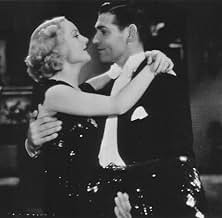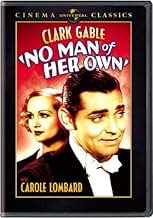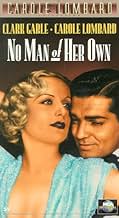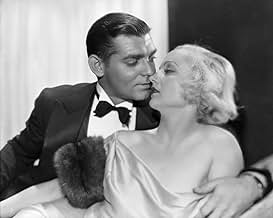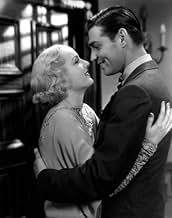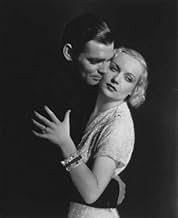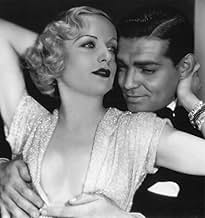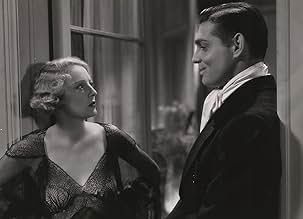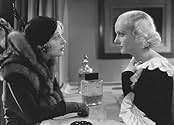IMDb RATING
6.6/10
1.8K
YOUR RATING
An on-the-lam New York card shark marries a small-town librarian who thinks he's a businessman.An on-the-lam New York card shark marries a small-town librarian who thinks he's a businessman.An on-the-lam New York card shark marries a small-town librarian who thinks he's a businessman.
- Awards
- 1 win total
Sammy Blum
- Door to Door Salesman
- (uncredited)
Mary Bracken
- High School Girl
- (uncredited)
Wallis Clark
- Thomas Laidlaw
- (uncredited)
Lillian Harmer
- Mattie
- (uncredited)
Margaret Marquis
- Girl in the Library
- (uncredited)
Featured reviews
I think other reviewers heard that this was supposed to be "a screwball comedy" and ran with that idea because they didn't know what else to say. I didn't see anything light and fluffy or "screwball" about it. Perhaps "offbeat" might be a more apt characterization. Gable's interpretation of the New York gambler was interesting because something in his usual sort of charming yet manly approach was notably lacking. He possessed the irreverent and utterly confident attitude we have come to associate with his other performances, but a number of his youthful facial expressions were of a more complex and unfamiliar sort. The reserved yet knowing way he nodded howdy-do upon introduction to Lombard's mother and then her father was especially amusing, I thought. There were also the many intriguing interactions with the actress, herself, particularly with regard to the touchy subjects of marriage and stability. The oft-subtle writing in this flick made for several interesting moments and both actors were fully up to the challenge of a sensitive and intelligent interpretation of the script. It is also interesting that there was allegedly no actual romantic attachment between these two because the chemistry was already quite evident. It must have miffed a number of the more glamorous Hollywood starlets when Lombard won Gable's heart in real life. Although beautiful, she wasn't glamorous, nor was she pretentious and affected, but more like the girl next door. I read that the library scene (where Gable sent her up a ladder as an excuse to examine her legs) single-handedly started some sort of decency league in the motion picture industry. The bluenoses are always with us, aren't they, shoving their childish attitudes down the throats of the adults. Much more risqué was the scene in which Lombard's predecessor, Kay, appeared on screen in a see-through nightgown that revealed critical aspects of her anatomy, both front and back. The thirties obviously were a much less prudish time because her gentlemen friends didn't even pay much attention, at least not overtly, and scenes such as that would not appear in movies again until the sixties. We've noted a similar sensuality in other movies from that era. As a society, we keep coming back to the cultural doldrums, where they are pushing wealth or war or something else that always seems to further the interests of those in control. Unconventional times like the thirties and the sixties are few and far between. It showed in this movie.
Recently my favorite video store acquired this movie on DVD, and I was very hopeful in renting it. As I am a huge fan of William Powell and Carole Lombard in "My Man Godfrey," I was astonished to hear the line "See you in church," dropped casually by Lombard in the middle of this film. That line, of course, appears early on in "My Man Godfrey."
I had always thought that this was a comic device, used for that particular film, but apparently it was something of comic parlance in the 1930s. After all, there is a four year spread between this film and "My Man Godfrey". If it still has resonance now, it must have been doubly meaningful to audiences then.
The plot itself is really thin, with Gable's character "Babe" deciding to marry Lombard's "Connie" on the flip of a coin. I don't know whether that was supposed to be THE COMIC DEVICE of the film or whether it was a throw-away notion coming from the screenwriters. It really doesn't matter much because it ruined the whole notion of the film, which is that Gable's "Babe" doesn't want any attachments of any kind to interfere with his life as a card sharp and cheat.
In the social history context, it is very interesting to see a film which shows men of wealth and status in New York City -- in the third year of the great Depression ( counting 1930, '31, and '32 as the epicenter of that disastrous time ) -- casually gambling away sums of money that would easily have sustained a family of four over an entire year !!
Lombard is an intriguing personality in the history of the American cinema and every one of her performances in the '30s speaks volumes about the genius she had contained within herself. She is so wistfully beautiful and her comic timing is usually impeccable. In this film she plays a woman who thinks she is wasting away in her small town, bored with her "unsteady" boyfriend and bored with her job as a librarian. The point is, however, that she was a young woman with a job in the depths of a depression that savaged the whole of the U.S. economy.
For audiences of that era, her character's decision to toss that safety and security for an "instant marriage" to the rogue "Babe" would have been both scandalous and highly romantic. The fact that Gable's very nefarious alternative lifestyle -- as a card sharp and con man -- nets him a plush apartment and plenty of ready money, doubles the scandalous nature of the plot. The fact that he and his confederates fleece the social class known as "New York Swells" accounts for some of the film's popularity in that time and in that era.
But Gable's "Babe" is not some Robin Hood type in a tuxedo. He and his partners cheat the rich and keep the money for themselves.
They are not progressives, they are not "reformers," they are crooks.
This enjoyable film earns a 5 from me for the supporting cast of actors and from Lombard's extraordinary ease of performance. The plot itself is so near to being utter nonsense that only her luminous and magnetic beauty saves the day for the entire ensemble. Clark Gable was the "good guy" with heartburn in "It Happened One Night," which is a far, far superior film. Here, he is just flat out all criminal with heartburn and no better than the bankers of that day, who foreclosed on homes and farms with nary a thought to the long-term consequences to their customers, to society, or to the health of the country which made them so prosperous to begin with. Seventy-five years later, these nuances are probably lost on people who don't know a lot about our true American history. The formulaic "happy ending" tells me that the producers ran out of story before the actors ran out of charisma or talent.
I had always thought that this was a comic device, used for that particular film, but apparently it was something of comic parlance in the 1930s. After all, there is a four year spread between this film and "My Man Godfrey". If it still has resonance now, it must have been doubly meaningful to audiences then.
The plot itself is really thin, with Gable's character "Babe" deciding to marry Lombard's "Connie" on the flip of a coin. I don't know whether that was supposed to be THE COMIC DEVICE of the film or whether it was a throw-away notion coming from the screenwriters. It really doesn't matter much because it ruined the whole notion of the film, which is that Gable's "Babe" doesn't want any attachments of any kind to interfere with his life as a card sharp and cheat.
In the social history context, it is very interesting to see a film which shows men of wealth and status in New York City -- in the third year of the great Depression ( counting 1930, '31, and '32 as the epicenter of that disastrous time ) -- casually gambling away sums of money that would easily have sustained a family of four over an entire year !!
Lombard is an intriguing personality in the history of the American cinema and every one of her performances in the '30s speaks volumes about the genius she had contained within herself. She is so wistfully beautiful and her comic timing is usually impeccable. In this film she plays a woman who thinks she is wasting away in her small town, bored with her "unsteady" boyfriend and bored with her job as a librarian. The point is, however, that she was a young woman with a job in the depths of a depression that savaged the whole of the U.S. economy.
For audiences of that era, her character's decision to toss that safety and security for an "instant marriage" to the rogue "Babe" would have been both scandalous and highly romantic. The fact that Gable's very nefarious alternative lifestyle -- as a card sharp and con man -- nets him a plush apartment and plenty of ready money, doubles the scandalous nature of the plot. The fact that he and his confederates fleece the social class known as "New York Swells" accounts for some of the film's popularity in that time and in that era.
But Gable's "Babe" is not some Robin Hood type in a tuxedo. He and his partners cheat the rich and keep the money for themselves.
They are not progressives, they are not "reformers," they are crooks.
This enjoyable film earns a 5 from me for the supporting cast of actors and from Lombard's extraordinary ease of performance. The plot itself is so near to being utter nonsense that only her luminous and magnetic beauty saves the day for the entire ensemble. Clark Gable was the "good guy" with heartburn in "It Happened One Night," which is a far, far superior film. Here, he is just flat out all criminal with heartburn and no better than the bankers of that day, who foreclosed on homes and farms with nary a thought to the long-term consequences to their customers, to society, or to the health of the country which made them so prosperous to begin with. Seventy-five years later, these nuances are probably lost on people who don't know a lot about our true American history. The formulaic "happy ending" tells me that the producers ran out of story before the actors ran out of charisma or talent.
... and I could definitely feel the chemistry between Lombard and Gable, even if they could not at this point. But it is a rather understated affair, even dragging at times.
It starts out lively and with promise, as a group of four card sharps make a killing against a mark and divide their loot. But afterwards a cop, Collins, comes up to speak to the ringleader, Jerry Stewart (Clark Gable), and lets him know he's on to what he's doing and is watching him. Also that same night, Jerry breaks up with one of his fellow card sharps, Kay (Dorothy Mackail), and she threatens to go to the DA about their activities in retaliation. Jerry decides to leave town for awhile until the immediate heat is off and travels to the tiny hamlet of Glendale. There he meets somebody who is as bored with the place as he is, town librarian Connie Randall (Carole Lombard). Things heat up quickly between them and they impulsively marry. Jerry never told Connie what he really does for a living, letting her believe he is a stockbroker. But being a gambler is all he knows, so what now, once they are back in New York? Complications ensue.
This is not a screwball comedy with Lombard doing her trademark screwball comedienne act. Lombard is a dramatic actress at this point, and doesn't really begin to hone her comedic chops until "Twentieth Century" in 1934. Gable is the one mainly carrying any comedic weight in this film, which is something he always did well.
I'd mildly recommend it mainly to see the only screen pairing of Lombard and Gable, years before they had any romantic interest in one another.
It starts out lively and with promise, as a group of four card sharps make a killing against a mark and divide their loot. But afterwards a cop, Collins, comes up to speak to the ringleader, Jerry Stewart (Clark Gable), and lets him know he's on to what he's doing and is watching him. Also that same night, Jerry breaks up with one of his fellow card sharps, Kay (Dorothy Mackail), and she threatens to go to the DA about their activities in retaliation. Jerry decides to leave town for awhile until the immediate heat is off and travels to the tiny hamlet of Glendale. There he meets somebody who is as bored with the place as he is, town librarian Connie Randall (Carole Lombard). Things heat up quickly between them and they impulsively marry. Jerry never told Connie what he really does for a living, letting her believe he is a stockbroker. But being a gambler is all he knows, so what now, once they are back in New York? Complications ensue.
This is not a screwball comedy with Lombard doing her trademark screwball comedienne act. Lombard is a dramatic actress at this point, and doesn't really begin to hone her comedic chops until "Twentieth Century" in 1934. Gable is the one mainly carrying any comedic weight in this film, which is something he always did well.
I'd mildly recommend it mainly to see the only screen pairing of Lombard and Gable, years before they had any romantic interest in one another.
Clark Gable and his great love, Carole Lombard, only made one film together - this one, "No Man of Her Own" - and they weren't even a couple. At the time of "No Man of Her Own," Lombard was married to William Powell, and Gable to a socialite named Maria Franklin. When he fell for Lombard a few years after this movie was made, it was some time before Franklin would give him a divorce.
A mustacheless Gable plays a cheating card shark who, while on the lam, meets a librarian (Lombard) and marries her. He's not planning that it be permanent; along the way, they fall in love.
Both stars are very good and have great chemistry. She's beautiful, and he's just one sexy devil with that smile and the way he looked at a woman. Pretty devastating, with or without the mustache. A great screen presence.
Someone commented that had Lombard not died, she would have signed with MGM and been paired with Gable in more films. It would be wonderful to have them together more than once. In 1937, in fact, when Jean Harlow died during the making of "Saratoga," Gable recommended that she be replaced with Lombard. Lest anyone think that was insensitive - the situation of a star dying in the middle of a film was new to everyone, no one knew how it would be handled, and poor Gable thought he was helping. People back then didn't think in terms of leaving a legacy and last films.
So we're stuck with the pre-code "No Man of Her Own." Not bad, not great, of interest because of its two stars.
A mustacheless Gable plays a cheating card shark who, while on the lam, meets a librarian (Lombard) and marries her. He's not planning that it be permanent; along the way, they fall in love.
Both stars are very good and have great chemistry. She's beautiful, and he's just one sexy devil with that smile and the way he looked at a woman. Pretty devastating, with or without the mustache. A great screen presence.
Someone commented that had Lombard not died, she would have signed with MGM and been paired with Gable in more films. It would be wonderful to have them together more than once. In 1937, in fact, when Jean Harlow died during the making of "Saratoga," Gable recommended that she be replaced with Lombard. Lest anyone think that was insensitive - the situation of a star dying in the middle of a film was new to everyone, no one knew how it would be handled, and poor Gable thought he was helping. People back then didn't think in terms of leaving a legacy and last films.
So we're stuck with the pre-code "No Man of Her Own." Not bad, not great, of interest because of its two stars.
10lora64
This is a pleasant kind of tale, easygoing and amusing. Clark Gable as the gambler Babe Stewart, meets quiet (i.e. repressed) librarian Connie Randall, played by Carole Lombard. At the library, when he corners her amongst the bookshelves, she asks, "Do you like Shakespeare?" and I like Gable's reply, "Oh Shakespeare's alright but sometimes you just don't feel like Shakespeare" says he gazing deep into her eyes. Just an amusing moment.
After a hesitant start they inevitably fall in love and impulsively decide to wed, and thereafter the plot unfolds. Gable resumes his dishonest card sniping activities (i.e. racket), however this clashes with the wifey on the domestic front. In time he plans to reform his ways, "Things gotta be different from now on," he tells the police, but there are complications ahead.
It's very interesting to see a younger Clark Gable who even at this stage was well established in his screen presence. And Carole Lombard couldn't be more beautiful! Great viewing for the fans of Gable and Lombard.
After a hesitant start they inevitably fall in love and impulsively decide to wed, and thereafter the plot unfolds. Gable resumes his dishonest card sniping activities (i.e. racket), however this clashes with the wifey on the domestic front. In time he plans to reform his ways, "Things gotta be different from now on," he tells the police, but there are complications ahead.
It's very interesting to see a younger Clark Gable who even at this stage was well established in his screen presence. And Carole Lombard couldn't be more beautiful! Great viewing for the fans of Gable and Lombard.
Did you know
- TriviaAlthough Carole Lombard and Clark Gable later became one of Hollywood's most famous couples, they were completely indifferent to one another during the making of this film. It was not until several years later that they met again and fell in love and got married. This was Gable and Lombard's only film together.
- GoofsEarly in the movie, Babe takes a taxi; there is a very clear view of the front hood of the cab, with the telephone number of the cab company. Later in the movie, Babe calls his wife with his new office phone number. He looks at the dial of his new phone and gives her the telephone number of the cab company.
- Crazy creditsThe cast is shown on a hand of poker cards, with the leads' faces shown as the various cards.
- ConnectionsFeatured in The Love Goddesses (1965)
- How long is No Man of Her Own?Powered by Alexa
Details
- Runtime
- 1h 25m(85 min)
- Color
- Aspect ratio
- 1.37 : 1
Contribute to this page
Suggest an edit or add missing content

